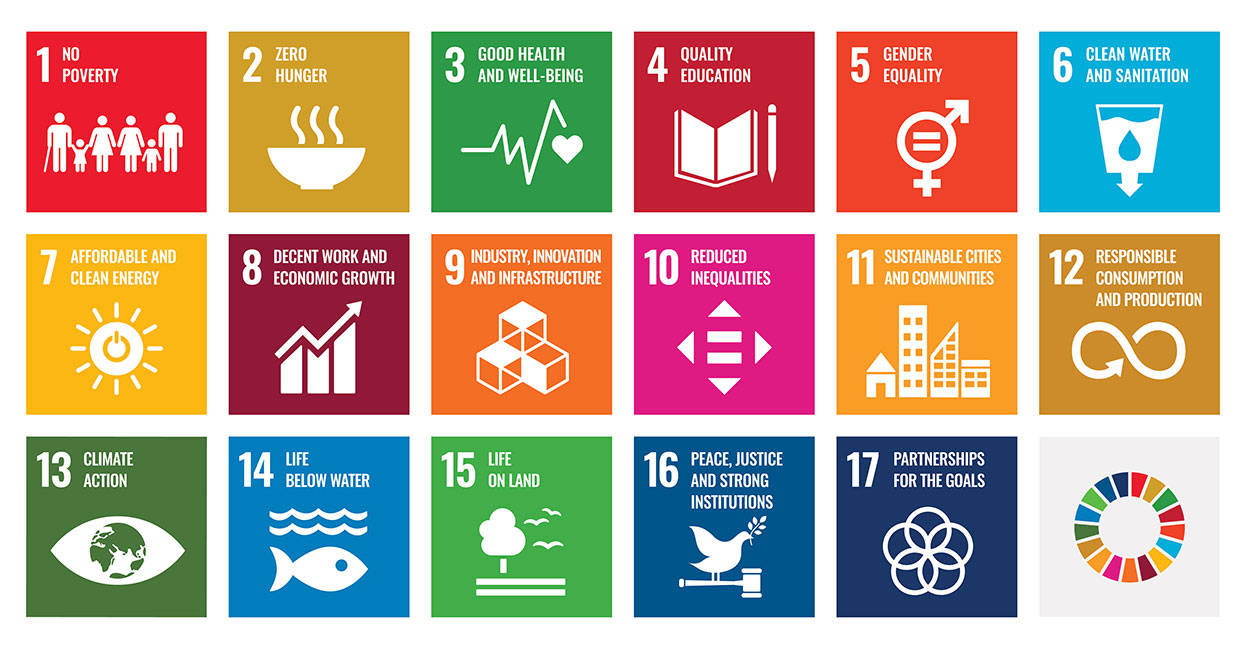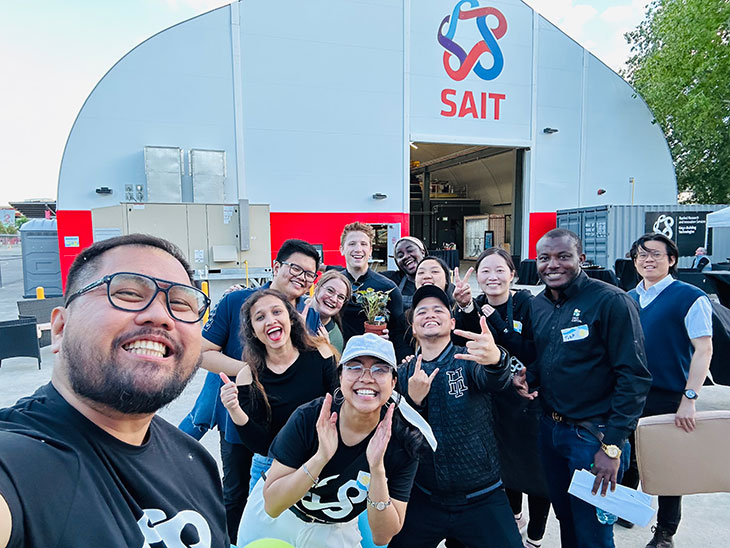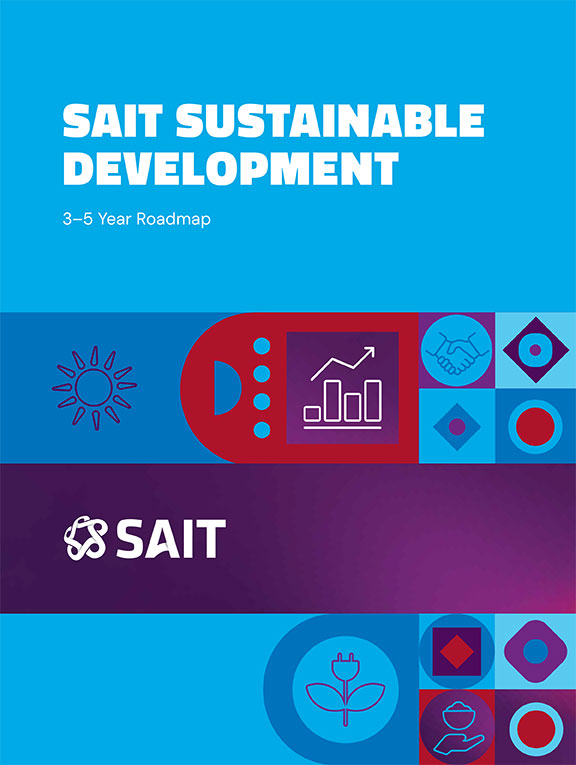The Office of Sustainability creates and implements a strategic vision for sustainable development at SAIT. We collaborate across SAIT to host sustainability events, share best practices, support engagement programs for students and employees, promote sustainable development initiatives on campus and create awareness campaigns to advance sustainability goals.
Engaging students in sustainable development provides opportunities for world-class learning experiences and the development of skills for in-demand green jobs. Sustainable development also drives opportunities for innovation leadership and industry engagement on campus.
Sustainable Development Roadmap
The Sustainable Development Roadmap is designed to align with SAIT’s 2025-28 Strategic Plan, Bold Futures and builds on our aspiration to be a leading partner in sustainable development through innovative applied research and education.
We're celebrating the new year with a new five-year Sustainable Development Roadmap — a tangible step toward a more sustainable future #HereAtSAIT.
Sustainability is a shared responsibility. We recognize the support and input from across SAIT that went into creating this roadmap through our Sustainable Development Advisory Council (SDAC).
To achieve our goals, we will continue to work collaboratively with the SAIT community. There are many opportunities for students, faculty, staff and partners to participate in SAIT’s sustainability journey — please reach out to learn more and get involved.
Kristine O’Rielly, Sustainability Lead and Conlan Donahue, Sustainability Coordinator
Office of Sustainability
Office of Sustainability priority areas for the next three years include:
- Socialize the 17 United Nations Sustainable Development Goals (SDGs) with students, employees and contractors.
- Grow sustainability student engagement opportunities.
- Share the SAIT sustainable development story and celebrate our journey.
- Improve waste reduction efforts
- Foster interdisciplinary collaboration among experts, faculty, and departments.
Sustainability
Sustainability is the desired state of preserving ecological balance, supporting ongoing economic production, and maintaining social equity to ensure a healthy environment, stable economy, and thriving communities for today and future generations.
Sustainable development
Sustainable development is a more dynamic concept that describes achieving sustainability. It involves pursuing growth and progress through strategies and practices that balance economic, environmental, and social goals.
Environmental, social and governance reporting
Environmental, social and governance (ESG) refers to a collection of corporate performance evaluation criteria that assess the robustness of an organization's governance mechanisms and ability to effectively manage its environmental and social impacts.
Continuous improvement
A continuous improvement approach prioritizes engagement with our partners and stakeholders and keeps us mindful of embracing long-term perspectives. It includes regular reflection, goal setting and adaptation based on changing societal shifts and emerging challenges.
Stewardship
Stewardship revolves around responsible management of resources, including greenhouse gas emissions. SAIT’s main campus is situated on 96 acres of land. By investing in sustainable practices, we can contribute to a healthy planet and set an example for students and our community.
Reciprocity
By incorporating the Indigenous value of reciprocity, we emphasize mutual exchange and understanding of diverse perspectives. The experiences, relationships, and recognitions we foster encourage psychological safety, equalizing opportunities, and learning from the talents and knowledge of others.
Partnership
A good partnership creates a platform for shared objectives and brings together diverse resources to leverage each other’s strengths, achieve greater long-term sustainability and increase value for all.
Aspiration
Through setting ambitious goals, envisioning positive change and committing to excellence in sustainability practices, we inspire leaders, faculty, staff, and students to lead by example.
Global perspective
Recognize the global implications of local actions, incorporate diverse cultural perspectives, and respect into sustainability efforts.
Education and awareness
Promote sustainability literacy and awareness that fosters a growth mindset.
Sustainability pillars
Ensure our work aligns with and advances the three pillars of sustainability: environmental stewardship, social responsibility and economic viability.
Innovation and leadership
Apply systematic sustainability solutions to institutional policies and initiatives to drive progress.
Transparency and continuous improvement
Commit to continuous improvement and accountability through regular and public performance assessments. Continuously refine strategies in response to new challenges and opportunities.
SAIT’s Sustainable Development Advisory Council (SDAC) is responsible for building a forum of voices for SAIT students, faculty, and staff on behalf of SAIT's sustainability initiatives and programs.
The purpose of the SDAC is to recommend, support and advocate for institutional sustainability development goals. Goals are tailored to enhance sustainability within academics, student engagement and campus operations.
- Kristine O'Rielly, Office of Sustainability
- Conlan Donahue, Office of Sustainability
- Kriztelle Brosoto, Student Eco-Ambassador
- Carley Abigail Catabian, Student Eco-Ambassador
- Lisa Miller, Facilities Management
- Bo Hill, Facilities Management
- Hanako Niska, Facilities Management
- Colin Pattison, MacPhail School of Energy
- Michelle Anderson, MacPhail School of Energy
- Camille Scheibner, MacPhail School of Energy
- Brad Rosenberger, School of Hospitality and Tourism
- Sonja Pernia, Academic Services
- Enda Morley, Academic Services
- Melanie Ross, Applied Research and Innovation Services, Green Building Technology Access Centre
- Alexandra Kodyra, Applied Research and Innovation Services, Green Building Technology Access Centre
- Stephen Barber, Health, Safety and Environment
- Holly Parks, Commercial Services
- Amy Dowd, Communications
- Kiera Savoie, Saitsa
The SAIT community continues to make significant strides to incorporate and address sustainability in projects, operations, programming and engagement.
The Sustainable Development Roadmap confirms SAIT’s commitment to sustainable practices and principles, to advancing the knowledge, skills and experiences of our people, and to making an impact.
Marcia Buchholz
Vice President, People and Culture

Green campus initiatives
Waste diversion and the circular economy at SAIT
SAIT’s waste program includes streams for beverage containers recycling, compost, mixed recycling, and trash that correspond to sorting bins located across campus. SAIT also has recycling programs for electronics, furniture, used clothing and household items.
Learn about waste reduction and diversion
Get involved in sustainability at SAIT
If you want to help make SAIT more sustainable, learn more about sustainability or spread the word about green initiatives on campus, there are programs and training available for students and employees.
Learn about communities and training
Buildings, grounds and transportation
SAIT is working to enhance our institutional climate action and adaptation efforts through sustainable transportation advocacy, utility monitoring and reduction strategies, and landscape management.
Learn about buildings and grounds
Applied research in sustainability
SAIT is one of Canada’s top five applied research colleges. Through four focused research centres, SAIT’s ARIS hub works with industry to address some of society’s biggest challenges with innovative and sustainable technology solutions.

Sustainability programs
SAIT offers programs designed to empower the next generation of environmental leaders with the knowledge, skills, and vision needed to address the pressing challenges of our world.
Sustainability goals and reporting
United Nations Sustainable Development Goals (UNSDG)
Sustainability at SAIT is guided by the United Nations Sustainable Development Goals (UNSDG).
The 17 UNSDG emphasize interconnectedness — highlighting the links between progress in one area and impact in another. They also provide a common language for discussion and evaluation around sustainable development.

Goals 1-6 comprise the People pillar of the UNSDG. The Prosperity pillar includes goals 7-11. Goals 12-15 fall under Planet and goals 16-17 represent the Peace and Partnerships pillars.
Since 2010, SAIT has recorded 254 instances of alignment with the UNSDG through more than 125 separate initiatives.
Number of SAIT initiatives in alignment with the UNSDG pillars:- People: 48
- Prosperity: 160
- Planet: 36
- Peace and Partnerships: 10
Example initiatives advancing UNSDG at SAIT:
- IG Lewis Student Emergency Fund (no poverty)
- Facilities Maintenance projects, including heating and cooling pumps and steam heat exchange (affordable and clean energy)
- Living Building Challenge (industry, innovation and infrastructure)
- SAIT’s Equity, Diversity and Inclusion Strategy (reduced inequalities)
- SAIT’s Integrated Water Management program (life below water)
- SAIT joins institutions across Canada to form Canadian Colleges for a Resilient Recovery (partnerships for the goals)
Events
Contact
Office of Sustainability
-
Email - sustainability@sait.ca

Oki, Âba wathtech, Danit'ada, Tawnshi, Hello.
SAIT is located on the traditional territories of the Niitsitapi (Blackfoot) and the people of Treaty 7 which includes the Siksika, the Piikani, the Kainai, the Tsuut’ina and the Îyârhe Nakoda of Bearspaw, Chiniki and Goodstoney.
We are situated in an area the Blackfoot tribes traditionally called Moh’kinsstis, where the Bow River meets the Elbow River. We now call it the city of Calgary, which is also home to the Métis Nation of Alberta.

